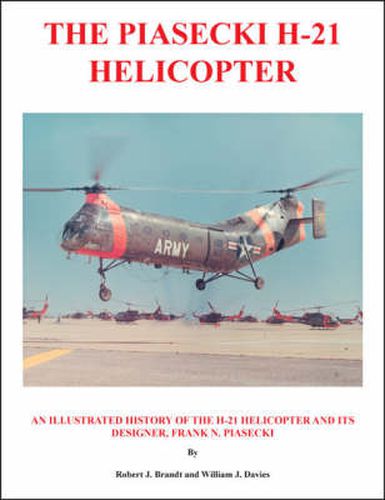Readings Newsletter
Become a Readings Member to make your shopping experience even easier.
Sign in or sign up for free!
You’re not far away from qualifying for FREE standard shipping within Australia
You’ve qualified for FREE standard shipping within Australia
The cart is loading…






This title is printed to order. This book may have been self-published. If so, we cannot guarantee the quality of the content. In the main most books will have gone through the editing process however some may not. We therefore suggest that you be aware of this before ordering this book. If in doubt check either the author or publisher’s details as we are unable to accept any returns unless they are faulty. Please contact us if you have any questions.
The only comprehensive illustrated history of Frank N. Piasecki and his H-21 advanced technology helicopter. The Piasecki H-21 became the first successful tandem-rotor cargo helicopter to enter mass production. Its innovative and unique design became the basis for the development of both the CH-46 and CH-47 helicopters, which remain in service to this day. The book covers the early life of Frank N. Piasecki and the development of his first helicopter, the single-rotor PV-2. Soon the XHRP-1 (Experimental, Helicopter, Transport, Piasecki, Model One) would appear and it was this helicopter which successfully demonstrated the feasibility of the tandem-rotor helicopter design. Successive improvements soon led to the HRP-1 and the more advanced HRP-2 which were flown by the US Marine Corps and US Coast Guard. The US Air Force expressed a need for a rescue helicopter that could operate in the extreme cold environment of the Arctic and issued a request for proposal. Frank Piasecki responded to this request with his H-21 tandem-rotor helicopter design. The Air Force liked what it saw and soon the H-21A Workhorse was in production for the US Air Force and the Royal Canadian Air Force. The rapidly expanding US Army Aviation Program saw the H-21 as a solution to meet its requirement for a helicopter capable of carrying an infantry squad. Soon the H-21C, now named Shawnee following the Army tradition of naming its helicopters after American Indian Tribes. The H-21 was soon in service with France, Germany, Sweden, Japan, and Burma. The H-21, now know as the Vertol 44, entered civil airline service with New York Airways. Five US Army helicopter companies, flying H-21 helicopters were deployed to Vietnam during 1961-62. These pioneering US Army helicopter companies proved that helicopters were capable of operating successfully combat. This success soon led to the rapid expansion and use of helicopters in Vietnam. The Frank N. Piasecki and his H-21, both long overlooked, are nevertheless true pioneers in the history of rotary-wing flight.
$9.00 standard shipping within Australia
FREE standard shipping within Australia for orders over $100.00
Express & International shipping calculated at checkout
This title is printed to order. This book may have been self-published. If so, we cannot guarantee the quality of the content. In the main most books will have gone through the editing process however some may not. We therefore suggest that you be aware of this before ordering this book. If in doubt check either the author or publisher’s details as we are unable to accept any returns unless they are faulty. Please contact us if you have any questions.
The only comprehensive illustrated history of Frank N. Piasecki and his H-21 advanced technology helicopter. The Piasecki H-21 became the first successful tandem-rotor cargo helicopter to enter mass production. Its innovative and unique design became the basis for the development of both the CH-46 and CH-47 helicopters, which remain in service to this day. The book covers the early life of Frank N. Piasecki and the development of his first helicopter, the single-rotor PV-2. Soon the XHRP-1 (Experimental, Helicopter, Transport, Piasecki, Model One) would appear and it was this helicopter which successfully demonstrated the feasibility of the tandem-rotor helicopter design. Successive improvements soon led to the HRP-1 and the more advanced HRP-2 which were flown by the US Marine Corps and US Coast Guard. The US Air Force expressed a need for a rescue helicopter that could operate in the extreme cold environment of the Arctic and issued a request for proposal. Frank Piasecki responded to this request with his H-21 tandem-rotor helicopter design. The Air Force liked what it saw and soon the H-21A Workhorse was in production for the US Air Force and the Royal Canadian Air Force. The rapidly expanding US Army Aviation Program saw the H-21 as a solution to meet its requirement for a helicopter capable of carrying an infantry squad. Soon the H-21C, now named Shawnee following the Army tradition of naming its helicopters after American Indian Tribes. The H-21 was soon in service with France, Germany, Sweden, Japan, and Burma. The H-21, now know as the Vertol 44, entered civil airline service with New York Airways. Five US Army helicopter companies, flying H-21 helicopters were deployed to Vietnam during 1961-62. These pioneering US Army helicopter companies proved that helicopters were capable of operating successfully combat. This success soon led to the rapid expansion and use of helicopters in Vietnam. The Frank N. Piasecki and his H-21, both long overlooked, are nevertheless true pioneers in the history of rotary-wing flight.